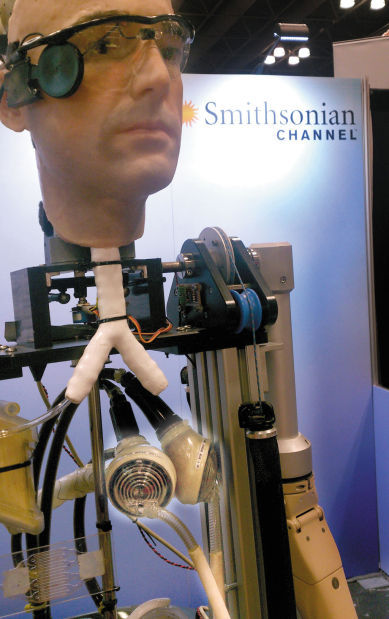A “bionic man” showcased in a Smithsonian Channel documentary and exhibit was designed as an artificial human, though it lacks several working organs.
But it has a beating heart — the Total Artificial Heart, made by Tucson-based SynCardia Systems Inc.
As reported in an Associated Press story published Saturday in the Star, the artificial human is the subject of a Smithsonian Channel documentary that airs this Sunday.
Called “The Incredible Bionic Man,” it chronicles engineers’ attempt to assemble a functioning body using artificial parts that range from a working kidney and circulation system to cochlear and retina implants. Altogether, its makers figure the robot has about 60 percent to 70 percent of the function of a human.
Parts worth about $1 million came from 17 manufacturers around the world, including SynCardia, which on Tuesday highlighted the use of its temporary Total Artificial Heart.
“We are proud that the SynCardia Total Artificial Heart is part of this documentary that shows the most advanced technology that can help humans live longer, healthier lives,” Michael Garippa, SynCardia Systems CEO and president, said in a news release.
SynCardia got involved when the bionic man’s makers contacted a company-certified heart center in England, SynCardia spokesman Don Isaacs said. The company lent the project the Total Artificial Heart, which carries a price tag of $124,700, Isaacs said.
Evolved from the original Jarvik-7 artificial heart, which was further developed at the University of Arizona Medical Center, SynCardia’s FDA-approved Total Artificial Heart is used to keep transplant patients alive and healthy while they await donor hearts. The Total Artificial Heart has kept more than 1,200 patients worldwide going for months or in some cases, years.
The company noted that Bertolt Meyer, a 36-year-old social psychologist who wears a bionic arm prosthesis and served as a sort of model for the bionic man, said in his documentary narration that SynCardia’s heart isn’t some future vision.
“Many of these (organs) are still prototypes,” Meyer says. “The hope is that one day they’ll solve the worldwide shortage of donor organs, but the (SynCardia) Artificial Heart is already saving lives.”
The SynCardia heart is available at 87 certified heart centers worldwide, with 33 others in the process of certification. The company is awaiting final U.S. Food and Drug Administration approval of an ultra-portable pneumatic driver for the heart. The driver is already approved for use in Europe has been used by more than 50 U.S. patients as part of clinical trials.
Isaacs said the company is “cautiously optimistic” that final FDA approval of the small driver will come by year’s end.
The company also is developing a smaller artificial heart for smaller adults and young people, and is looking to develop a version of the heart and driver that could be approved as a “destination therapy” for people who aren’t transplant candidates.
And that means patients would walk around with a SynCardia heart for the rest of their lives.
The bionic man documentary, which is already available online, and related museum exhibits are part of a collaborative effort that includes the Smithsonian Museum, London’s Science Museum, the Smithsonian Channel and England’s Channel 4.





